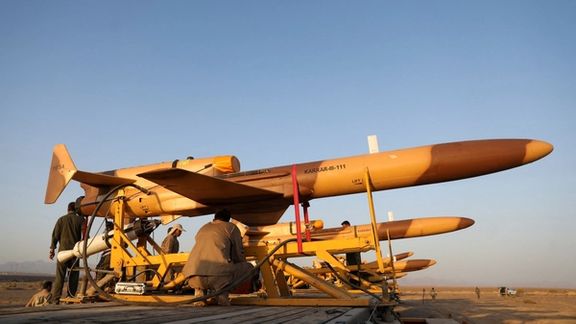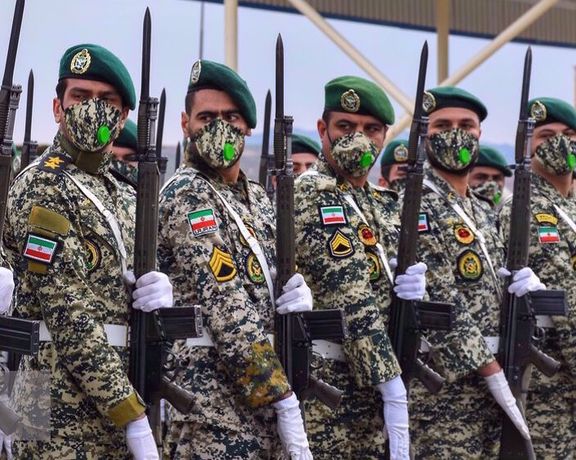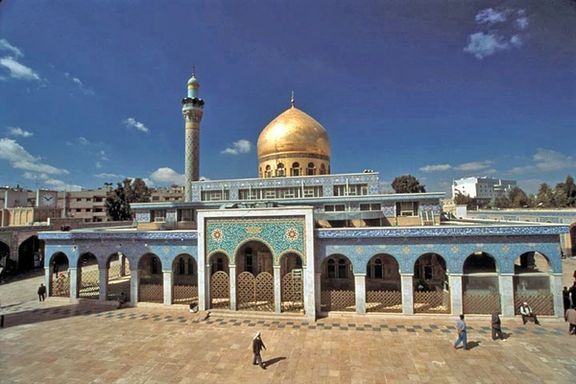Biden 'Looking Forward' To Working With Netanyahu On Iran Threat

President Joe Biden says he looks forward to working with the new Israeli Prime Minister Benjamin Netanyahu, to address many challenges, including threats from Iran.

President Joe Biden says he looks forward to working with the new Israeli Prime Minister Benjamin Netanyahu, to address many challenges, including threats from Iran.
In a statement released on Thursday, the US President called Netanyahu “my friend for decades” and said he looks forward “to working with Prime Minister Netanyahu, who has been my friend for decades, to jointly address the many challenges and opportunities facing Israel and the Middle East region, including threats from Iran.“
Netanyahu who always opposed the Obama-era nuclear accord with Iran known as JCPOA was a close ally of Biden’s predecessor, Donald Trump and opposed Biden’s policy to negotiate with Tehran to revive the deal. Trump abandoned the agreement in 2018 demanding more concession by Iran.
However, Biden’s diplomatic effort came to a standstill last August, and since then Iran has been supplying suicide drones to Russia to attack Ukraine and has killed hundreds of antigovernment protesters. Both the United States and its European allies say that resuming the nuclear talk sis not their priority in the current situation.
Biden also praised more integration in the Middle East, calling it a „more hopeful vision of a region at peace, including between Israelis and Palestinians.“ This is an endorsement of the 2020 Abraham Accords that established full ties between Israel and four Arab states. Reports in recent days indicate Netanyahu is hopeful to also establish relations with Saudi Arabia.
Military cooperation between Israel and several Arab states is also expanding aimed mainly at containing the Iranian threat.

Benjamin Netanyahu was sworn in as Israel's prime minister with a hard-right cabinet promising to thwart Iran's nuclear program and beefing up Israel's military.
Israel’s parliament, or Knesset, passed a vote of confidence in his new government Thursday with 63 voted in favor and 54 votes against.
Outgoing Yair Lapid, who was in the Prime Minister's office for only half a year, said during the swearing -in session that his joint government with Bennett thwarted US President Joe Biden's efforts to revive the 2015 Iranian nuclear deal.
“Contrary to all the rageful predictions and prophecies, our government managed to stop the signing of a revived nuclear agreement with Iran,” Lapid said.
"The Revolutionary Guards were not removed from the list of terrorist organizations and the International Atomic Energy Agency did not close its investigatory files on Iran," he added.
In his parliamentary speeches beforethe swearing in on Thursday, the 73-year-old Netanyahu said his three big missions are stopping Iran’s nuclear program, developing state infrastructure, and restoring internal security and governance to Israel.
Earlier, in an interview with Al-Arabiya Netanyahu reiterated his long-standing opposition to the 2015 Iran nuclear deal and urged Saudi Arabia to ‘normalize’ with Israel.
He called the JCPOA, signed by world powers in 2015, a “horrible agreement because it allowed Iran basically with international approval, to develop a nuclear and basically an atomic arsenal paved with gold, with hundreds of billions of dollars of sanction relief.”

As Russia launched its 10th large-scale missile attack on Ukraine Thursday, it also used Iranian-made drones to try to overwhelm Kyiv’s air defenses.
Moscow fired 69 cruise missiles and an undetermined number of Iranian suicide drones. Ukrainian officials said that they had shot down 11 Iranian-made drones and most of the missiles.
Observers were anticipating a large-scale Russia missile attack to disrupt electricity and water for Ukrainians on New Year eve, but Ukraine’s air defenses have substantially improved, and the damage Thursday seemed to be manageable.
Iran’s delivery of hundreds of Shahed-131 and 136 drones to Russia has enraged the West that is assisting Ukraine to resist Moscow’s invasion. Western officials have been citing Iran’s weapons deliveries as one reason why they are not inclined to continue nuclear talks with Tehran.
Iran has claimed that it delivered the drones before the war, but it has not clearly denied their use in attacking Ukraine.
The United States is scrambling to try to "choke off Iran’s ability to manufacture the drones” as US forces help “Ukraine’s military to target the sites where the drones are being prepared for launch…,” according to a source that spoke with the New York Times.
Russia’s missile and drone attacks started in September targeting Ukraine’s civilian infrastructure after its military campaign began to unravel. So far Ukraine has shot down 430 drones Russia has used in conjunction with the missile barrages. Most of these drones are believed to have been Iranian made.

As US officials briefed the flagship New York Times on efforts to stop Iran sending drones to Russia, the Jerusalem Post played down “a new era of drone wars.”
A 2,000-word New York Times story published December 28 was based on un-named United States officials proclaiming Iran and Russia to be “building a new alliance of convenience.” This had prompted an “expanding US program…to choke off Iran’s ability to manufacture the drones” as US forces help “Ukraine’s military to target the sites where the drones are being prepared for launch…”
But the day before the Times outlined the “breath of the [US] effort,” the Jerusalem Post was more sanguine. “No matter how many Iranian drones Russia has access to, it can’t defeat Ukraine,” it noted. With the vast majority of the drones used by Russia easily shot down, “big army formations like tanks, infantry and artillery, still decide wars,” the Post observed.
The newspaper also conceded that while Iran had developed drones due to its lack of an effective air-force in the face of international sanction, Israel, whose advanced US-supplied aircraft include F35s, was “one of the world’s leaders in drone technology.”
‘An important tool’
Both the Ukraine war and a trumpeted ‘Iranian threat’ are boosting Israel’s weapons sales, including to disillusioned customers of Russia, as its arms exports reached a record $11.3 billion in 2022. “Iran…is suddenly sending drones to Russia, and is forming a military and security alliance with Russia…the war is helping Israel in that sense…as a by-product Israel is increasing its share of the arms market,” Yossi Melman, Haaretz Intelligence correspondence, told Voice of America December 22.
“Iranian military technology is seen as an important tool against the growing threat of Iranian military power – the concern about Iran is shared by both European and Middle Eastern countries,” VOA said.
But while Iran’s supply of drones to Russia – and Tehran claims these were sent before the current phase of conflict began February – has helped Israel’s arms sales, the US has been less successful, the New York Times reported, in hampering Iran’s drone industry given the expertise developed by Iran over many years evading American sanctions and surveillance. This was, the Times said, “proving as difficult as the decades-old drive to deprive Iran of the components needed to build the delicate centrifuges it uses to enrich near-bomb-grade uranium.”
Israeli expertise in “undermining Iran’s nuclear program” could help over Iran’s drone exports, the paper suggested: “In the effort to stop the drone attacks,” the Times said, “Mr Biden’s [President Joe Biden] aides are also engaging an ally with a long history of undermining Iran’s nuclear program: Israel.”
The Times referred to a recent video meeting between Jake Sullivan with Israel’s top national security, military and intelligence officials – which came as talk increases in Israel of a military attack on Iran and as Benjamin Netanyahu returns to power with the support of ultra-Zionists. “The fact that the administration chose to highlight the discussion…was notable,” the Times observed.

The military hierarchy of the Islamic Republic has once again threatened the United States and Israel saying it will “firmly” respond to any attack.
The General Staff of the Armed Forces issued a statement on Wednesday claiming the “enemies” hatched different military, economic, and political plots against the Islamic Republic over the past four decades.
Using the term “enemies” is a favorite of Supreme Leader Ali Khamenei to refer to the United States, Israel, US allies in the region and in Europe.
The statement further alleged that during the recent demonstrations in Iran “the main strategy was to wage a media and cognitive war to influence young Iranians.”
Following Khamenei’s lead, Iranian officials claim the ongoing antigovernment protests across Iran – ignited by death in custody of 22-year-old Mahsa Amini -- are instigated by foreign enemies.
“The Iranian Armed Forces will not allow the enemies to undermine the security of the people and the country and will continue to closely monitor the sinister moves of the enemies, especially the US and Israel,” reads the statement. The military leadership appointed by Khamenei also renewed their allegiance to him.
Iran’s aging authoritarian ruler Khamenei has always referred to past and current protests as “riots” incited by “enemies” and accused protesters of “sedition”.
The number of protesters killed by security forces since mid-September has now risen to over 500, with tens of thousands injured and arrested.

Israel says its ability to strike Iranian nuclear sites has improved and attacks could happen in a few years, while Iran is entrenching near the Syrian capital.
Iran is seeking to revive the expansion of its presence near Damascus, something it has always sought to do but was previously prevented by Russia, a report by Asharq Al-Awsat on Tuesday said, adding that Iran's objective is to create another “southern suburb”, commonly known as Dahieh, like the Hezbollah-dominated suburb of the Lebanese capital Beirut.
The article alleges that the Islamic Republic is scaling up its purchase of homes and establishing new camps in areas adjacent to the zones of influence of Russia, which is currently preoccupied with its war in Ukraine.
The plan is to ultimately expand the influence of Iranian forces in the towns of the southern Damascus countryside adjacent to the Sayyidah Zeinab, a town in the Rif Dimashq Governorate, less than 10 kilometers to Damascus.
The town, locally known as Sitt Zaynab, is the main stronghold of Iranian militias and their proxies in the southern countryside of the capital.
Since late in November, Syria and Iran have been deploying new air defense systems, including jamming and early warning systems, around Damascus to prevent Israeli airstrikes in the area. There are reports that the new systems were built by Korean and Chinese companies and provided by Iran as part of agreements reached between Damascus and Tehran.
On Wednesday, Israel's defense minister said it could attack Iranian nuclear sites in two or three years, in unusually explicit comments about a possible timeline.
With international efforts to renew the 2015 nuclear deal (JCPOA) having stalled, the Iranians have ramped up uranium enrichment, a process that can eventually yield fuel for nuclear bombs -- though they deny having any such design. For more than a decade, Israel has issued veiled threats to attack its arch-enemy's nuclear facilities if it deems world powers' diplomacy with Tehran a dead end. However, some experts doubt Israel has the military clout to deliver lasting damage to Iranian targets that are distant, dispersed and well-defended.

On Tuesday, the chief of staff of the Israeli Defense Forces Lieutenant General Aviv Kochavi said Israel’s level of preparedness for an operation in Iran has dramatically improved.
In a speech at the Israeli Institute for National Security Studies, Kochavi said that the Islamic Republic is seeking to deploy hundreds of missiles in Syria along with deploying "thousands of Shia militiamen." The army chief said Israel managed to disrupt the Iranian vision in Syria "to establish a second Hezbollah in Syria."
Iran claims it is defending the Sayyidah Zeinab shrine, which is visited regularly by thousands of Shiite pilgrims from Iran, Iraq, Lebanon, Afghanistan, and Pakistan. Before the war broke out in Syria about 12 years ago, most of the population of the southeastern countryside of Damascus, including the towns of Babila, Yalda and Beit Sahem were Sunni Muslims.
However, after Damascus regained control of the area in the summer of 2018 and local families started returning to the towns, they were approached by strangers looking to buy their homes and real estate. According to reports, it became clear that those buying the houses were the families of fighters from militias affiliated with the Islamic Republic, originally from the Shiite towns of al-Foua and Kefraya in the Idlib countryside.